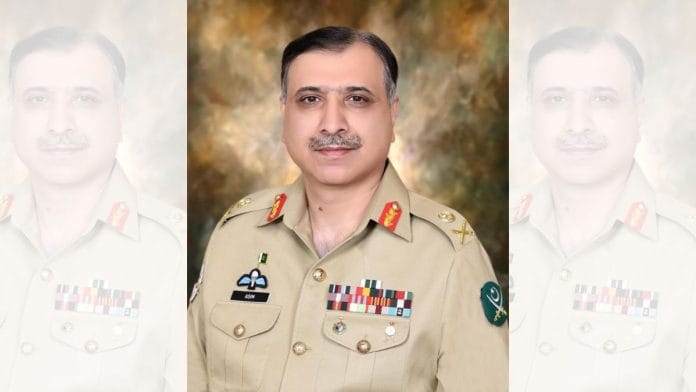New Delhi: The appointment of Inter-Services Intelligence (ISI) chief Lieutenant-General Asim Malik as Pakistan’s new National Security Adviser marks an effort to reopen a secret diplomatic channel with India, two senior intelligence officials familiar with the decision have told ThePrint. General Asim’s appointment—the first of a serving intelligence chief—came Tuesday, as the threat of war loomed over both countries.
Earlier India-Pakistan crisis had seen NSAs play a key role in defusing near-war tensions between the two countries. The Indian side, however, had long complained that it was unclear if Pakistan’s NSAs had the authority to speak for the military, and had influence over its decision-making processes.
“The idea of appointing General Malik was raised by former Prime Minister Nawaz Sharif in a meeting with his brother, Prime Minister Shehbaz Sharif,” a Pakistani political leader told ThePrint. “This was to make sure there would be no daylight between messages conveyed by Pakistan’s political leadership and the military itself.” The brothers are believed to have met on 27 April, to chart out a strategy to avoid war with India.
Following a Lashkar-e-Taiba (LeT) attack on an Indian military facility in 2016—which sparked off raids across the Line of Control—then-NSA and former Lieutenant-General Nasser Khan Janjua held multiple meetings with his Indian counterpart. The two men are known to have held meetings at a hotel in Bangkok, to find means to restore peace on the Line of Control.
“To me, it’s pretty clear the army is seeking complete control of the dialogue with India, and the Prime Minister of Pakistan is only too willing to concede it,” said Ayesha Siddiqa, a London-based strategic affairs expert and columnist for ThePrint. “From India’s point of view, this might make sense, since it would be clear that any proposals made by General Malik have the institutional support of the Pakistan Army.”
“Even though the Pakistan Army will have direct representation in future talks,” she added, “the dialogue will not be easy, because the army will be wary of conceding anything that might undermine its long-term domestic primacy in Pakistan.”
The earlier dialogue between NSAs took place against the backdrop of personal efforts by Prime Minister Narendra Modi and then-Prime Minister Nawaz Sharif to build a dialogue on Kashmir. Prime Minister Narendra Modi had made considerable efforts to push forward the peace process, even making a surprise visit to Lahore in December 2015 to attend the wedding of Prime Minister Nawaz Sharif’s granddaughter.
The effort had, however, imploded in the face of resistance from Pakistan’s Army. Early in 2016, after terrorists targeted an Indian Air Force (IAF) base in Pathankot, Prime Minister Sharif proved unable to deliver on promises to act against its perpetrators, the Jaish-e-Mohammed (JeM).
In an interview to Pakistan-based Geo News earlier this week, General Janjua described developing a warm relationship with Doval, and said both men were unified by a common interest in securing peace.
The backchannel negotiations were interrupted by the JeM attack on central police forces at Pulwama in Kashmir, and the Indian Air Force raids which followed it. The backchannel was resumed, though, through meetings held in London involving ISI officer Major-General Sahibzada Isfandiyar Pataudi, and RAW’s Pakistan operations in-charge, R. Kumar.
General Qamar Javed Bajwa, then Pakistan’s Army chief, is believed to have proposed the idea in an October 2018 visit to London, where he met with the United Kingdom’s chief of defence staff, General Nicholas Carter, and National Security Adviser, Mark Sedwill. The General argued that resumption of backchannel dialogue would reduce the risk that nuclear-armed India and Pakistan might enter a crisis through missteps or miscalculations
Later, Doval is known to have held several rounds of dialogue with Moeed W. Yusuf, Prime Minister Imran Khan’s de-facto NSA and Special Assistant on the National Security Division and Strategic Policy Planning. These efforts played a key role in shaping the ceasefire that went into force at the LoC in 2021.
The most successful phase of backchannel diplomacy was conducted between diplomats Satinder Lambah and Tariq Aziz, under Prime Minister Manmohan Singh and Pakistan’s military ruler, General Pervez Musharraf. The two diplomats crafted an arrangement that would institutionalise LoC as a border, but make it irrelevant, like the one that divides the two sides of Ireland. Events, however, undermined General Musharraf’s position in Pakistan, and forced him to back away from the deal.
(Edited by Amrtansh Arora)
Also Read: India must keep Pakistan on tenterhooks. The day of reckoning will come like a thunderbolt







Why back channel. Why not a normal diplomatic conversation between neighbours who have many disagreements, some of which have led to war and could do so again. Talks guided by realism and modest expectations.